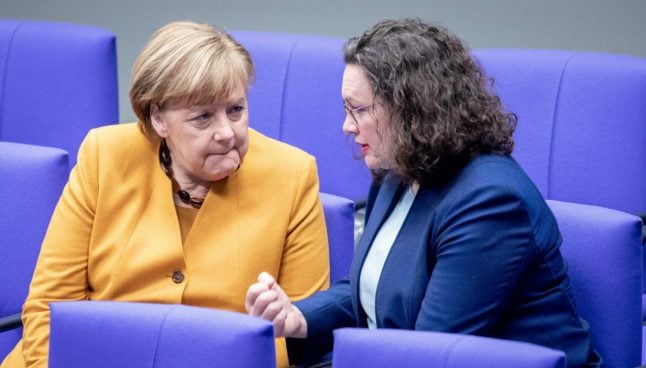In a shock announcement on Sunday, centre-left Social Democratic Party (SPD) leader Andrea Nahles said she was stepping down from her party's top jobs following late May's European elections drubbing.
The 48-year-old's decision left the SPD in disarray, and raised questions over the survival of Merkel's coalition.
Whether the unhappy partnership between Merkel's centre-right Christian Democratic Union and its sister party the Christian Social Union (CDU/CSU) alliance and the SPD can go on until the end of its term in 2021 could now hinge on Nahles' successor.
Anxious to calm the jitters over her government, Merkel said on Sunday that it will push on and fulfil its mandate.
“What I want to say for the government is that we will continue with our work with all seriousness and with great responsibility,” the veteran leader said in a statement to the press.
The leadership crisis at the SPD could not have come at a worst time for Merkel's CDU, which was itself struggling to halt a haemorrhage of voters as the younger generation ditched it in droves for the Greens.
READ ALSO: Why can't Germany's Social Democrats pull themselves together?
Voices are growing louder within the coalition for the parties to part ways.
Harald Christ, deputy chief of the SPD's economy forum, warned that “Nahles stands for the existence of the GroKo – whose stability is now in question.”
“In my view what comes next is the end of the GroKo – everything else leads nowhere,” he told Bild daily.
The deputy leader of the CDU-CSU alliance, Carsten Linnemann also warned in an interview with RedaktionsNetzwerk Deutschland that “if we are unable to progress with the SPD, then we should draw a line under this and ask ourselves if continuing with the GroKo still makes sense.”
Crisis to crisis
The alliance between Merkel's Christian Democrats and the SPD was fragile from the start.
Wounded by an election rout in 2017, the SPD had initially sought to go into opposition, but was reluctantly coaxed into renewing a partnership with Merkel.
Many within the party however remained wary of continuing to govern in Merkel's shadow, and the coalition has lurched from crisis to crisis.
The SPD, Germany's oldest party, had initially planned to re-examine the alliance in the autumn — half-way through the four-year mandate.
READ ALSO: The winners and losers: Six things to know about the EU election in Germany
But with a free-fall in its ratings unending, the SPD's timetable may yet be accelerated.
After last Sunday's European election, the SPD has been staring at the prospect of another debacle in three upcoming state polls in Saxony, Brandenburg and Thueringia, where the far-right AfD is poised to make
significant gains.
With its anti-immigration campaign, the AfD in 2017 drew voters angry with Merkel's decision to let in more than a million asylum seekers into Germany.
But it is now the Greens which may have become the biggest headache for the SPD.
READ ALSO: 'Surfing the Zeitgeist': How the Greens won over Germany
While sharing the centre-left position on the political spectrum, the Greens are proving more attractive to young voters because of their environmental platform.
In a national survey released Saturday, the Greens came in top for the first time – enjoying more support than Merkel's CDU-CSU alliance. The environmental group had a lead over the SPD of around 15 percentage points.



 Please whitelist us to continue reading.
Please whitelist us to continue reading.
Member comments